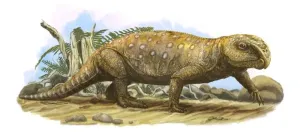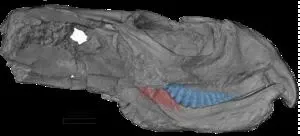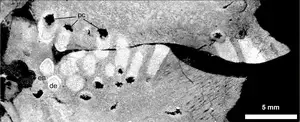(Press-News.org) A team of researchers from the University of Bristol have shed light on the life of the ancient reptile Rhynchosaur, which walked the earth between 250-225 million years ago, before being replaced by the dinosaurs.
Rhynchosaurs are a little-understood group of roughly sheep-sized ancient reptiles that thrived during the Triassic Period, a time of generally warm climates and tough vegetation.
In the new study, the researchers studied specimens found in Devon and used CT scanning to see how the teeth wore down as they fed, and how new teeth were added at the backs of the tooth rows as the animals grew in size.
The findings, published today in Palaeontology, show that these early herbivores likely eventually starved to death in old age, the vegetation taking its toll on their teeth.
“I first studied the rhynchosaurs years ago,” said team-leader Professor Mike Benton from Bristol’s School of Earth Sciences, “and I was amazed to find that in many cases they dominated their ecosystems. If you found one fossil, you found hundreds. They were the sheep or antelopes of their day, and yet they had specialized dental systems that were apparently adapted for dealing with masses of tough plant food.”
Dr Rob Coram, who discovered the Devon fossils, said: “The fossils are rare, but occasionally individuals were entombed during river floods. This has made it possible to put together a series of jaw bones of rhynchosaurs that ranged in age from quite young, maybe even babies, through adults, and including one particularly old animal, a Triassic old-timer whose teeth had worn right down and probably struggled to get enough nutrition each day.”
“Comparing the sequence of fossils through their lifetime, we could see that as the animals aged, the area of the jaws under wear at any time moved backwards relative to the front of the skull, bringing new teeth and new bone into wear,” said Thitiwoot Sethapanichsakul who studied the jaws as part of his MSc in Palaeobiology. “They were clearly eating really tough food such as ferns, that wore the teeth down to the bone of the jaw, meaning that they were basically chopping their meals by a mix of teeth and bone.”
“Eventually, though, after a certain age – we’re not sure quite how many years – their growth slowed down and the area of wear was fixed and just got deeper and deeper,” added Dr Coram. “It’s like elephants today – they have a fixed number of teeth that come into use from the back, and after the age of seventy or so they’re on their last tooth, and then that’s that.
“We don’t think the rhynchosaurs lived that long, but their plant food was so testing that their jaws simply wore out and presumably they eventually starved to death.”
The rhynchosaurs were an important part of the ecosystems on land during the Triassic, when life was recovering from the world’s greatest mass extinction, at the end of the preceding Permian Period. These animals were part of this recovery and setting the scene for new types of ecologies when first dinosaurs, and later mammals became dominant, as the modern world was being slowly constructed.
By comparing examples of earlier rhynchosaurs, such as those from Devon, with later-occurring examples from Scotland and Argentina, the team were also able to show how their dentitions evolved through time, and how their unique teeth enabled them to diversify twice, in the Middle and then in the Late Triassic. But in the end, climate change, and especially changes of available plants, seem to have enabled the dinosaurs to take over as the rhynchosaurs died out.
The paper
‘Unique dentition of rhynchosaurs and their two-phase success as herbivores in the Triassic.’ By Sethapanichsakul, T., Coram, R.A. and Benton, M.J. Palaeontology. Doi: 10.1111/pala.12654
END
Ancient herbivore’s diet weakened teeth leading to eventual starvation, study suggests
2023-06-09
ELSE PRESS RELEASES FROM THIS DATE:
Personalized vaccines may revolutionize cancer treatment
2023-06-09
Researchers from Edith Cowan University (ECU) are leading ground-breaking global trials which could save lives by changing how we treat cancer in the near future.
ECU Centre for Precision Health Clinical Professor Adnan Khattak presented the trial’s latest results at the 2023 American Society of Oncology (ASCO) congress in Chicago this week, the biggest cancer treatment conference in the world with more than 45,000 attendees.
Professor Khattak outlined how survival and disease recurrence rates among people who’d had high-risk skin cancers (melanomas) removed improved significantly when an mRNA vaccine ...
THE LANCET INFECTIOUS DISEASES: Taking a common diabetes medication after testing positive for SARS-CoV-2 reduces risk of developing long COVID by 40%, study finds
2023-06-09
Peer-reviewed / Randomised Controlled Trial / People
Peer-reviewed / Randomised Controlled Trial / People
The Lancet Infectious Diseases: Taking a common diabetes medication after testing positive for SARS-CoV-2 reduces risk of developing long COVID by 40%, study finds
US study of 1,126 overweight and obese people finds 6.3% of participants who took metformin, a medication commonly used to control blood sugar in people with type 2 diabetes, within three days of testing positive for SARS-CoV-2 reported a long COVID diagnosis within 10 months, compared to 10.4% of those who received a placebo.
This is the first published randomised ...
Confidence in vaccines has plummeted in Africa since the pandemic – Study across eight countries shows
2023-06-09
Public confidence in vaccines has plunged across sub-Saharan Africa since the COVID-19 pandemic, according to a study of 17,000 people, across eight countries, published today in the peer-reviewed journal Human Vaccines & Immunotherapeutics.
The findings come as the World Health Organization and UNICEF have reported the largest sustained fall in uptake of routine childhood immunizations in three decades.
Six million fewer children in Africa received routine shots for diseases including tetanus, polio, diphtheria and measles over the past ...
LGB adults at higher risk of suicidal thoughts and self-harm
2023-06-09
Lesbian, gay and bisexual (LGB) people are more than twice as likely than their straight peers to experience suicidal thoughts or self-harming behaviours, finds a new study led by UCL researchers.
The study, published in Social Psychiatry and Psychiatric Epidemiology, is the first ever to analyse nationally representative data on sexual orientation and suicidality in England whilst being able to compare individual sexual minority groups. The researchers analysed data combined from two household surveys of 10,443 English adults (aged 16 and over), representative of the population, sampled in 2007 and 2014.
As ...
University of Arizona launching computer science and engineering B.S.
2023-06-08
Right now, United States employers are unable to fill around 1 million computer science-related jobs because of a lack of qualified candidates, as estimated by the Bureau of Labor Statistics. And the demand isn’t going away – the bureau projects employment in the field to grow much faster than average through 2031, while the number of graduates will continue to lag behind job openings.
This workforce need is the primary reason the College of Engineering will soon offer a bachelor's degree in computer science and engineering, said Michael Wu, head of the Department of Electrical and Computer Engineering, which houses the ...
Children in Chile saw 73% fewer TV ads for unhealthy foods and drinks following trailblazing marketing restrictions
2023-06-08
Chilean policies aimed at reining in unhealthy food marketing are succeeding in protecting children from the onslaught of television advertisements (TV ads) for these products, according to new research. The country’s multi-phased regulations, which began in 2016, have led to a 73% drop in children’s exposure to TV ads for regulated foods and drinks (those that exceed legal thresholds for calories, sugar, salt or saturated fat) by 2019. During this time, the number of ads for unhealthy foods dropped 64% on all TV programs ...
Incomplete imaging for transient ischemic attack emergencies increases stroke risk
2023-06-08
Leesburg, VA, June 8, 2023—According to an accepted manuscript published in ARRS’ own American Journal of Roentgenology (AJR), transient ischemic attack (TIA) emergency department (ED) encounters with incomplete neurovascular imaging were associated with higher odds of subsequent stroke within 90 days.
“Increased access to urgent neurovascular imaging in patients with TIA may represent a target that could facilitate detection and treatment of modifiable stroke risk factors,” wrote first author Vincent M. Timpone, MD, from the department of radiology at the University of Colorado Hospital in Aurora.
Timpone et al. ...
Researchers create engineered human tissue to study mosquito bites, disease
2023-06-08
Researchers Create Engineered Human Tissue to Study Mosquito Bites, Disease
Scientists hope to use this new platform to study how pathogens that mosquitoes carry impact and infect human cells and tissues.
By Eric Eraso | June 8, 2023
A UCF research team has engineered tissue with human cells that mosquitoes love to bite and feed upon — with the goal of helping fight deadly diseases transmitted by the biting insects.
A multidisciplinary team led by College of Medicine biomedical researcher Bradley Jay Willenberg with Mollie Jewett (UCF Burnett School of Biomedical Sciences) and Andrew Dickerson (University of Tennessee) ...
Mass General Cancer Center researchers share Insights on the evolution of proton radiotherapy
2023-06-08
As one of the first hospitals in the world to establish a proton radiotherapy program to treat cancer, Massachusetts General Hospital (MGH) and the Mass General Cancer Center have been pioneers in using and improving proton therapy for treating both benign and malignant tumors effectively while delivering a lower dose of radiation to tissue surrounding the target site. Researchers at MGH have led and continue to lead studies that are defining the best use of proton therapy, which is now being offered at 106 centers worldwide.
In a Review article published in The ...
Utilizing data to predict hospital wait times – it can save more than your patience!
2023-06-08
INFORMS Journal Manufacturing & Service Operations Management New Study Key Takeaways:
Researchers develop a method to more accurately predict and showcase hospital wait times to patients and emergency personnel by using new information that is learned in the intake process.
This method provides more up-to-date wait times allowing patients and paramedics to make choices about which emergency department to go to.
This process streamlines patient flow, creates more uniform spread of patients and lowers congestion across emergency departments, and could improve patient outcomes ...




